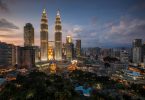NEW DELHI, India (eTN) – Visibly satisfied after explaining her and Culture Ministry’s role in the Ram Setu affidavit to Indian Prime Minister Manmohan Singh, Indian Culture Minister Ambika Soni did not forget to remind her detractors within Congress that the battle was far from over and she had not resigned yet.
Asked if she was hurt, Soni said, “There is nothing called hurt in politics. I have learnt it is not enough to work with honesty. You have to do more.”
She refused to get drawn into any controversy and said it was not proper to speak in public about differences in the party.
On India’s fight against detractors who’ve been pointing their finger to the sub-continent and southeast Asia for increasing world pollution levels, gas emissions and contribution to global warming, the tourism minister cleared the air and gave eTurbo News this exclusive.
Ambika Soni, Minister of Tourism and Culture for India, said measures to be taken in the climate change positions should not be, in any way, discriminating. The policies should not be aimed at India or the developing world, while India’s still trying to recognize its tourism potential.
Soni said, “Many of our apprehensions would be minimized. For indeed, the developing countries feel the world councils should make new technology (such as water harvesting and non-conventional methods of energy sourcing namely solar), poverty alleviation programs and employment generation accessible to those of us who are still trying to build up tourism potentials.”
An urgent plea from countries, including India, demands assistance for financing new environmental technology. “Technologies don’t come easy. Also, we need to guard against travel advisories which will hinder tourism to our destinations. Many of us are paying the price for emissions which are not generated by us. Though I don’t want to bring up a debate between the developed and the developing world, certainly the emissions have not been contributed by us or the less-developed nations,” said Soni adding that she’s only voicing out concerns by the developing states, not just of India, given that each country, in its own sovereign way, should take steps to sensitize itself to protect the environment.
Though India’s tourism is geared towards environmental protection and sustainability according to the minister, Soni’s government is still working hard to tackle the issue. “Though people say that 15 to 20 years (when the worst of global warming is actually felt) are of no concern to India, we still worry about climate change,” she said. And “While we’re doing all these, we don’t want non-tariff barriers,” she added.
Same apprehensions on climate change affecting tourism and overall blame are shared by India with other countries such as the Latin American nation constituents. They, too, have articulated the concern. “Our contention, not that we are not sensitive to climate change, is in fact, that India is bearing the burden and getting the blame for global warming and climate change. It’s no fault of India. We are adapting new technology. We are trying to tap into non-conventional sources of energy primarily solar, and hope that we can avail of nuclear energy (which we cannot afford just yet). Trouble is: we cannot talk about preserving our natural heritage; we cannot ask other countries around the world to adopt methods and road maps. We feel these to be unfair because these are discriminatory issues, and we are just beginning to grow travel and tourism,” said Soni.
Sixty years after independence, India is beginning to develop its tourism economy, with respect to poverty alleviation and job creation. These are the current target India has set. “We have more than a billion people. We’re seeing through that education is available to all and that health facilities become universal,” the minister added.
Soni thinks even climate change policies should not eliminate their tourism opportunities. Rather, give all destinations equal chance to address global warming with tourism goals. “However, other countries may like to put (emission) counters on planes coming here, or may tell guests to go to places where there are already-existing properties, not to young destinations only about to build hotels. It’s just not fair! The developing world, most of whom cannot afford to develop faster than the richer counterparts, should be given easy access to the new technology which will prevent climate change and global warming. We think this technology should be subsidized,” Soni said.






















